A major tool for college students and creative professionals alike, Apple’s laptops have dominated the way users approach productivity on the go.
The MacBook line debuted in 1991 — though there have been a variety of different naming conventions and models over the years. Remember the early PowerBooks of the 1990s? The iBook G3? And of course the biggest news in recent years has been the arrival of MacBooks powered by Apple’s M-series chips in 2021.
From the original PowerBook to the newest MacBook Pro and the Air, we explore the evolution of Apple’s iconic laptops and the innovative changes each generation brought.
PowerBook 100
A successor to Apple’s first-ever laptop — the Mac Portable — the PowerBook 100 featured a setback keyboard, which made room for palm rests, and a front-and-center trackball — for both left- and right-handed users — that would set the default standard for laptops.
Although it was criticized for lacking a floppy disk drive, it went on to become a huge success. Manufactured by Sony, it featured a Motorola 68000 processor, 2MB of RAM and a 9-in. backlit LCD. PCworld named it the 10th greatest PC of all time in 2006.
PowerBook 500
Apple released its PowerBook 500 series in 1994. It included a trackpad, which replaced the trackball, a built-in microphone, Ethernet and stereo speakers. Depending on the model, it also included a 9.5-in. black-and-white or color display and a Motorola 68LC040 CPU.
PowerBook G3
The PowerBook G3 was Apple’s most customizable laptop. It offered a PowerPC G3 chip that was up to two times faster than the Pentium and Pentium II processors used in PC notebooks and desktops, a CD-ROM and DVD-ROM drive, built-in video output, swappable expansion bays for multiple storage options and lithium-ion batteries. It also featured a flip-up keyboard for easy access to the RAM expansion slot and removable hard disk drive.
iBook G3
Now known as the “clamshell,” Apple’s first iBook design was influenced by the first iMac. It featured a polycarbonate shell in two translucent colors, a 12.1-in. high-resolution active-matrix display, a built-in CD-ROM drive, a 3.2GB hard disk drive, wireless networking and a convenient carrying handle.
Powered by a PowerPC G3 processor, it included a 6-hour lithium-ion battery and a trackpad that supported tap, double-tap and dragging capabilities. Its integrated power plug glowed amber when the battery was charging and turned green when it was fully charged. The iBook G3 also included a sleep indicator beacon light that indicated when the iBook was asleep or turned off.
PowerBook Titanium G4
Apple unveiled its Titanium PowerBook G4 in 2001. It featured a PowerPC G4 processor, a slot-loading DVD drive and had a 5-hour battery life. At 1-in. thick and 5.3 pounds, it included a 15.2-in. TFT widescreen active-matrix display and outperformed Pentium III-based notebook systems by up to 30%. Apple’s use of metal as an exterior casing would later become standard in all Mac products.
MacBook Pro
Apple released the first MacBook Pro, which featured a 1-in. thick aluminum enclosure and weighed 5.6 pounds, in February 2006. It was the first MacBook to feature a backlit keyboard and Apple’s new MagSafe magnetic power connector — a failsafe method to keep the MacBook Pro from getting damaged if the power cord was accidentally tugged. The MacBook Pro also included a 67% brighter display, a scrolling trackpad, and Apple’s Sudden Motion Sensor that was designed to protect the hard drive in case of a fall.
The first Mac notebook based on an Intel processor, the 15-in. MacBook Pro delivered up to four times the performance of the PowerBook G4. Apple released a 17-in. model a few months later.
MacBook (2006)
Apple released the “MacBook” in 2006 to replace both the iBook and 12-in. PowerBook so that its entire portable lineup offered Intel Core Duo processors. With its sleek design, Apple reported its new MacBook was “the world’s most advanced consumer notebook.” At 1 in. thick, it was 20% thinner than the iBook.
It was up to five times faster than the iBook and up to four times faster than the 12-in. PowerBook. It featured a 13.3-in. glossy widescreen display that was 79% brighter than the iBook and PowerBook, a built-in iSight video camera, a MagSafe power adapter, Sudden Motion Sensor, a scrolling trackpad and came in two colors: white and black.
MacBook Air
Apple’s game-changing MacBook Air was the world’s thinnest notebook when CEO Steve Jobs famously introduced it by pulling it out of an envelope during Macworld 2008. Because of its thinness, the MacBook Air was the first Mac to remove the optical Superdrive and feature a multitouch trackpad with gestures.
It included a 13-in. LED display and a full-size, backlit keyboard along with a built-in iSight video camera. Apple later introduced an 11.6-in. model to compete with netbooks and ultrabooks.
MacBook (2008)
Apple refreshed its white polycarbonate MacBook with a new aluminum unibody enclosure and a multitouch trackpad. Steve Jobs boasted the new MacBook was the industry’s greenest notebook, as it met “stringent Energy Star 4.0, EPEAT Gold and RoHS environmental standards, leading the industry in the elimination of toxic chemicals by containing no brominated flame retardants, using only PVC-free internal cables and components, and using energy efficient LED-backlit displays that are mercury-free and made with arsenic-free glass.”
The entry-level MacBook featured all-metal enclosures, pro-performance notebook graphics and was priced $700 less than the 2006 MacBook Pro to appeal to a wider audience.
MacBook Pro with Retina Display
Apple first brought its notable high-resolution display from the iPhone over to its Mac lineup with the MacBook Pro with Retina Display. At the time, it was the world’s highest resolution notebook display on the market, with over 5 million pixels — 3 million more than a high-definition television. It was also the lightest MacBook Pro ever and nearly as thin as the MacBook Air.
The MacBook Pro with Retina Display, like the MacBook Air, didn’t include an optical Superdrive but did include solid-state flash storage. Apple notably nixed the “MacBook Pro” text from the lower bezel and moved it to the bottom chassis in favor of a minimalistic look. This generation was also the first (and last) to feature an HDMI port, along with refined speakers and a thinner MagSafe 2 power port. Apple introduced a 13-in. model with Retina display a few months later; in 2015, Apple dropped the “with Retina display” suffix and updated its MacBook Pro line with Force Touch enabled trackpads.
MacBook (2015-2019)
Apple brought back the beloved MacBook after the line merged with the MacBook Pro in 2009. At just 2 pounds and only 13.1 mm thick, the new MacBook overtook the MacBook Air as the thinnest and lightest Mac ever. It included a 12-in. Retina display, a redesigned butterfly mechanism keyboard and a Force Touch trackpad.
Apple introduced Thunderbolt 3/USB-C ports in favor of the MagSafe adapter and standard USB-A ports for a slimmer form factor and increased power efficiency. Along with a fanless design, the new MacBook was available in a slew of different colors to match the iPhone 6s and iPad Pro lineup — gold, silver, space gray, and later, rose gold. Apple killed off the MacBook in July 2019, ending model overlap with the MacBook Air.
MacBook Pro (2016)
2016 marked the 25th anniversary for Apple’s line of portable computers. That year, Apple introduced its newest iteration of the MacBook Pro at a special event in October. The refresh included a thinner, lighter chassis that rivaled the MacBook Air — so much so that the MacBook Pro without Touch Bar replaced it entirely (though Apple strategically kept the Air available at an entry level price point of $999).
Apple also unveiled upgraded 13-in. and 15-in. models with a new and revolutionary input device: the multitouch OLED Touch Bar, which replaced the row of traditional function keys and dynamically adapted for each active application. The Touch Bar models also included an integrated Touch ID sensor; Thunderbolt 3/USB-C ports; a 50% larger trackpad; a second-generation butterfly mechanism keyboard; a brighter, wider gamut display in line with the iPhone 7 and iPad Pro; a significantly faster PCIe-based solid state drive; improved speakers with better dynamic range; and a new color previously only available in the 2015 MacBook — space gray. Apple noted that there were more online orders for the laptop than there had been for any previous MacBook Pro.
MacBook Pro (2017-2019)
Apple unveiled a revised MacBook Pro in July 2019, with new Coffee Lake chips from Intel, including optional 8-core processors in the more expensive 15-in. model. (That model also can be ordered with up to 32GB of RAM.) Both the 13-in. and 15-in. versions got a new butterfly-style keyboard designed to avoid problems with earlier models. Pricing remained unchanged for the base models (though the entry-level 13-in. version got Apple’s Touchbar), with the 13-in. starting at $1,299 and the 15-in. starting at $2,399.
MacBook Air (2018-2019)
This generation MacBook Air got a long overdue redesign in late 2018 (and a modest update in 2019); it offers a Retina display like Apple’s more expensive laptops and is available in three colors: silver, space gray and gold. The MacBook Air comes with Touch ID, an updated (as of 2019) butterfly-style keyboard and a Force Touch trackpad. It has a 13.3-in. screen, weighs 2.75 pounds, offers up to 1.5TB of storage, up to 16GB of RAM and has two Thunderbolt 3 ports. It runs on a dual-core I5 chip running at 1.6GHz. Pricing starts at $1,099 ($999 with the education discount).
MacBook Pro 16-in. (2019)
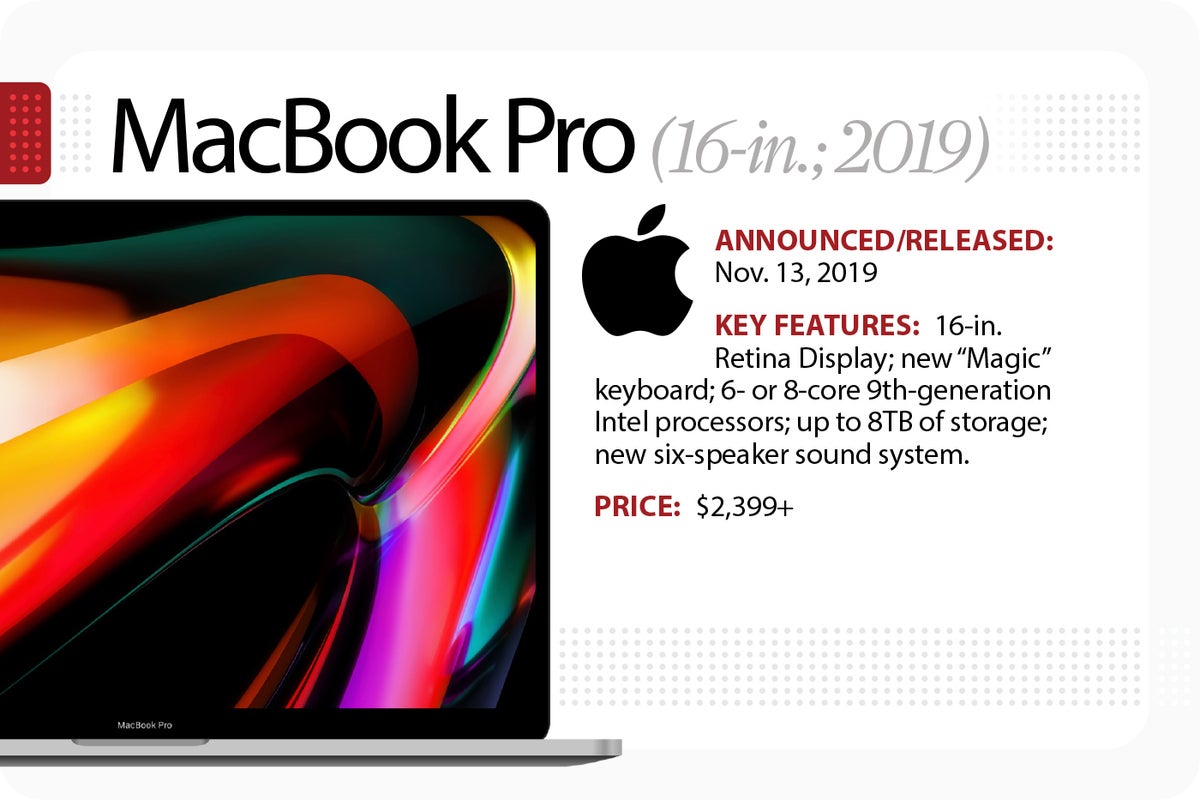 Apple / Foundry
Apple / FoundryThe 16-in. MacBook Pro introduced in late 2019 offered the largest Retina Display to date offered in an Apple laptop. The display has a native resolution of 3072×1920 pixels and a 226-ppi pixel density. Almost as noteworthy is the new keyboard, which replaces the old, unloved, butterfly keyboard. It can be ordered with as much as 64GB of RAM and, for the first time, up to 8TB of SSD storage. It features 9th-gen Intel processors and an advanced thermal design to keep heat levels down. And in another first, it has a high-fidelity six-speaker sound system and an upgraded mic array.
MacBook Pro 13-in. M1 (2020)
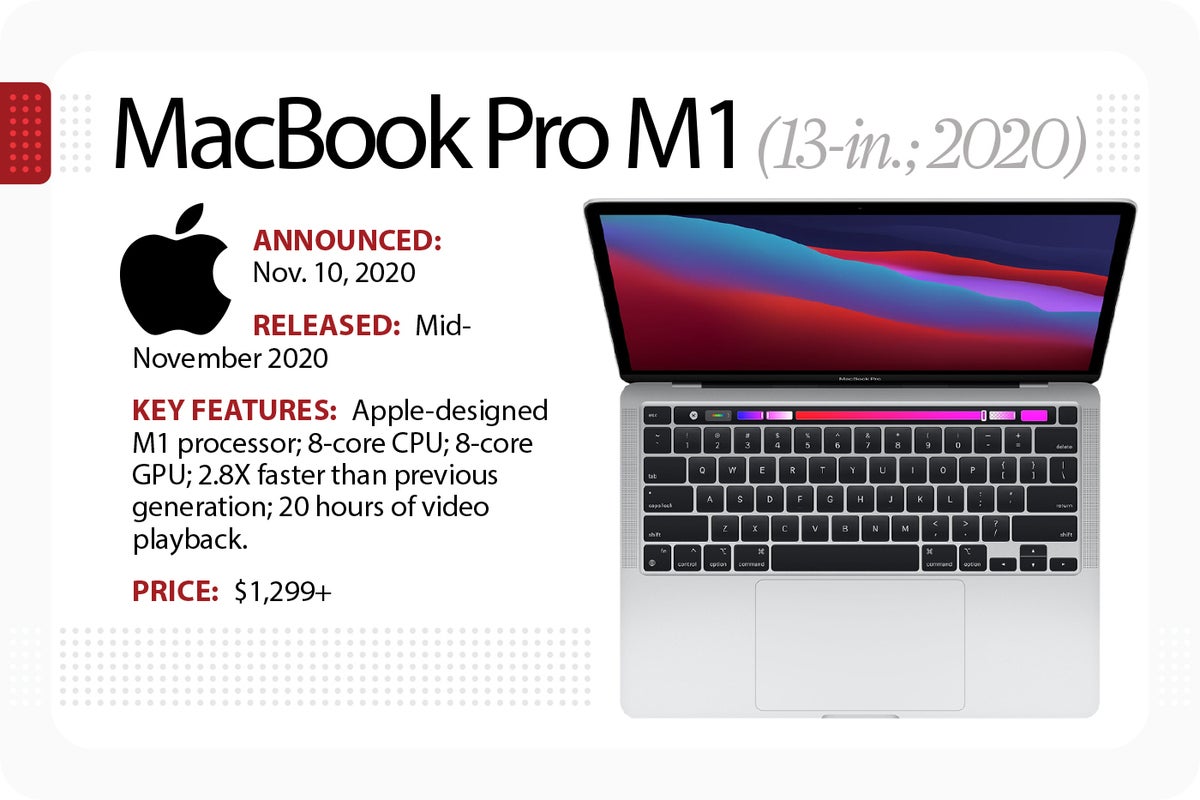 Apple / Foundry
Apple / FoundryThe 13-in. MacBook is the first Apple laptop to get the company’s new “M1” processor, which is designed to deliver fast speeds while maintaining all-day batter life. “M1 is by far the most powerful chip we’ve ever created,” Apple CEO Tim Cook said, calling the laptop’s performance “mind-blowing.” The Pro model (announced in tandem with the M1 MacBook Air) arrives with an 8-core CPU, an 8-core CPU, two thunderbolt ports and weighs in at 3 pounds. Other than the new processor, the design remained largely unchanged, though it does get the redesigned “Magic” keyboard. It’s available in Silver and Space Gray.
MacBook Air M1 (2020)
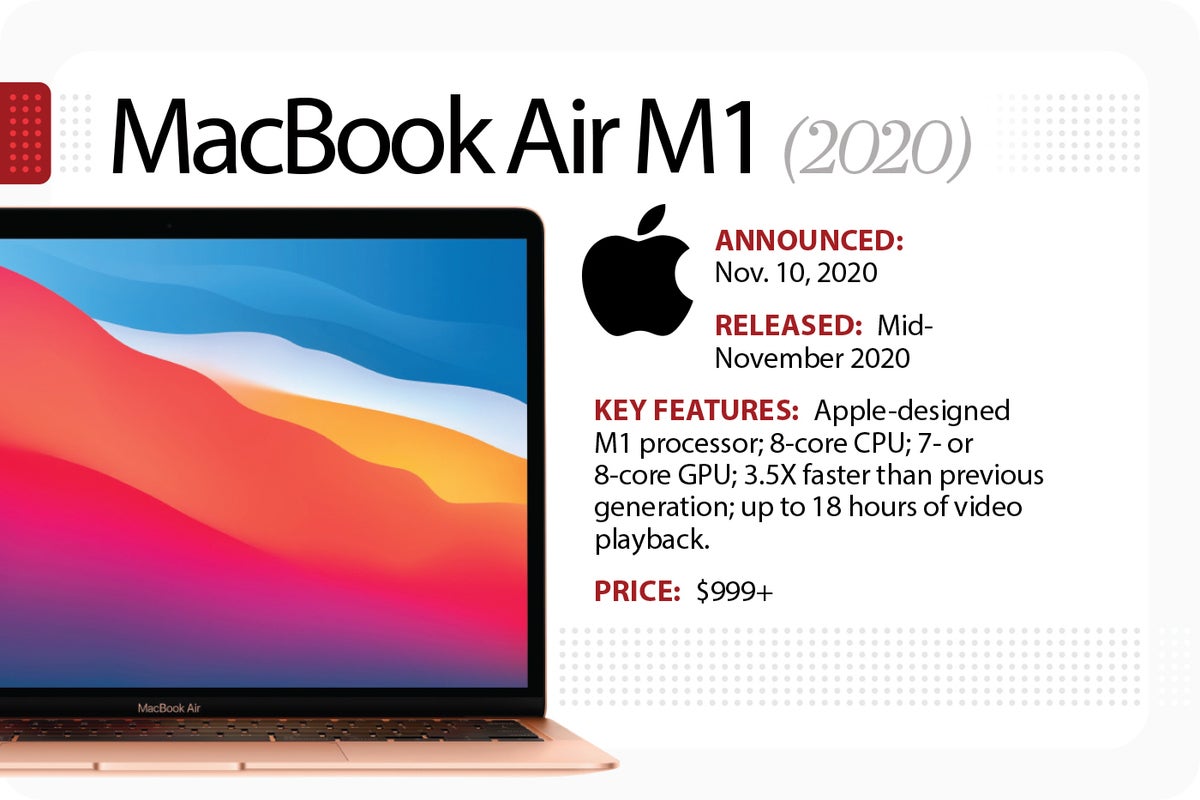 Apple / Foundry
Apple / FoundryThe latest MacBook Air (unveiled alongside the M1 13-in. MacBook Pro), gets Apple’s new 8-core M1 chip, with either a 7- or 8-core GPU. Apple says the new Air is 3.5x faster than its predecessor with graphics that are 5x faster and SSD performance twice as fast. It features a fanless design that keeps the Air quiet and delivers up to 18 hours of continuous video playback. Like the MacBook Pro, the Air also gets Apple’s revamped “Magic” keyboard. It’s available in silver, space gray and gold.
MacBook Pro 14-in and 16-in M1 (2021)
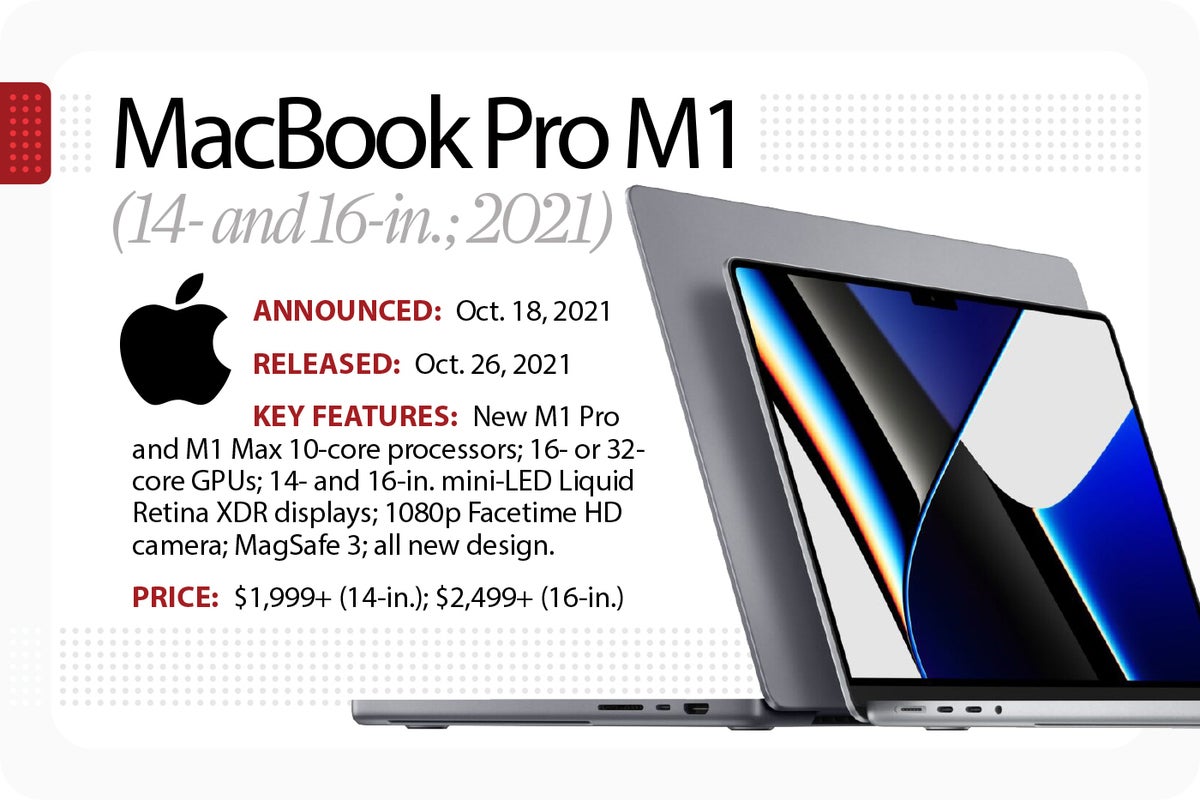 Apple / Foundry
Apple / FoundryThe redesigned 16-in. MacBook Pro and the all-new 14-in. version get turbocharged versions of Apple’s M1 processor — the M1 Pro and M1 Max. Either model can be ordered with either processor, though upgrading to the M1 Max chips adds several hundred dollars to the bottom line. Apple says the M1 Pro is 70% faster than the M1 chip and offers 3x the memory bandwidth; the M1 Max doubles the GPU to 32 cores for 4x faster GPU performance than the M1. The new design ditches the Touch Bar for physical function keys, gets mini-LED XDR displays, and has three Thunderbolt 4 ports, an SDXC card slot and an HDMI port. There’s a 1080p HD camera and six speakers.
MacBook Air M2 (2022)
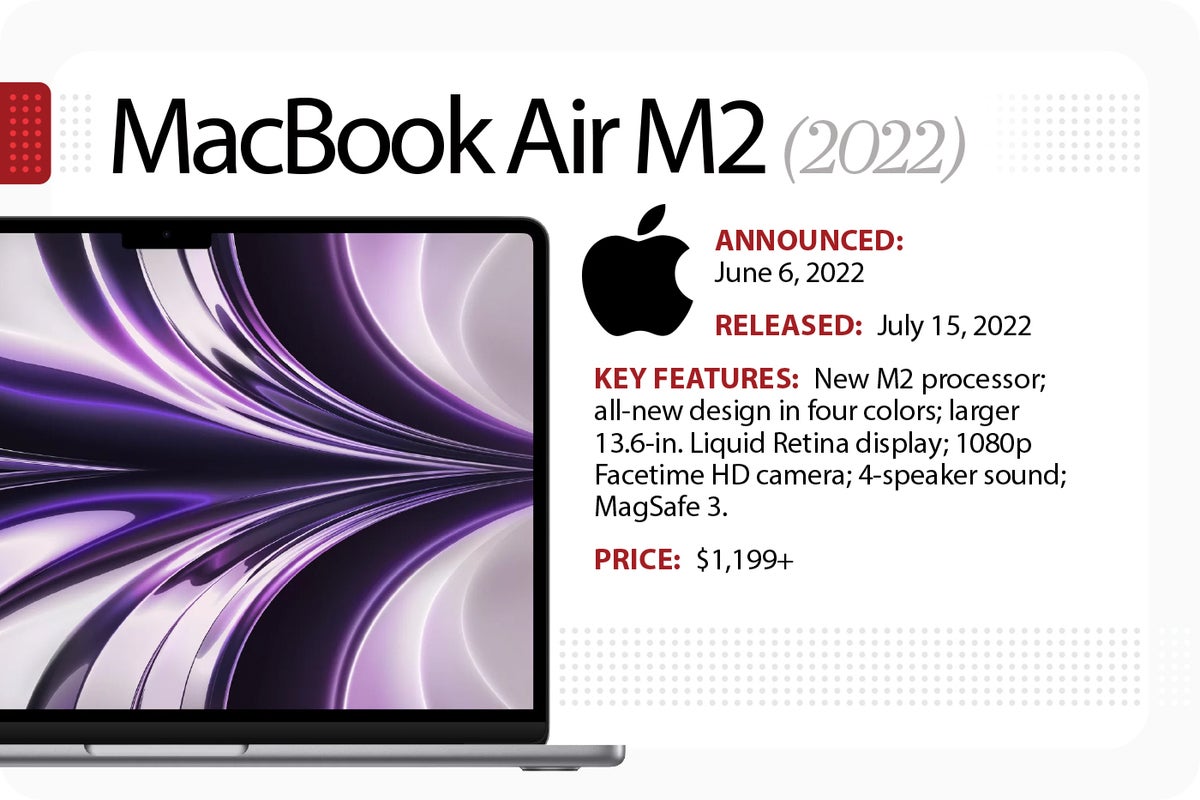 Apple / Foundry
Apple / FoundryWith the arrival of the new M2 processor, the MacBook Air gets an entirely new design in four different colors and a larger 13.6-in Liquid Retina display. It weighs in at 2.7 pounds, is 11.3mm thick, and — in addition to Silver and Space Gray — now comes in Midnight and Starlight colors. Other additions include a four-speaker sound system, 1080p HD camera, physical function keys, and support for fast charging with an optional 67-watt USB-C power adapter.
MacBook Pro 13-in. M2 (2022)
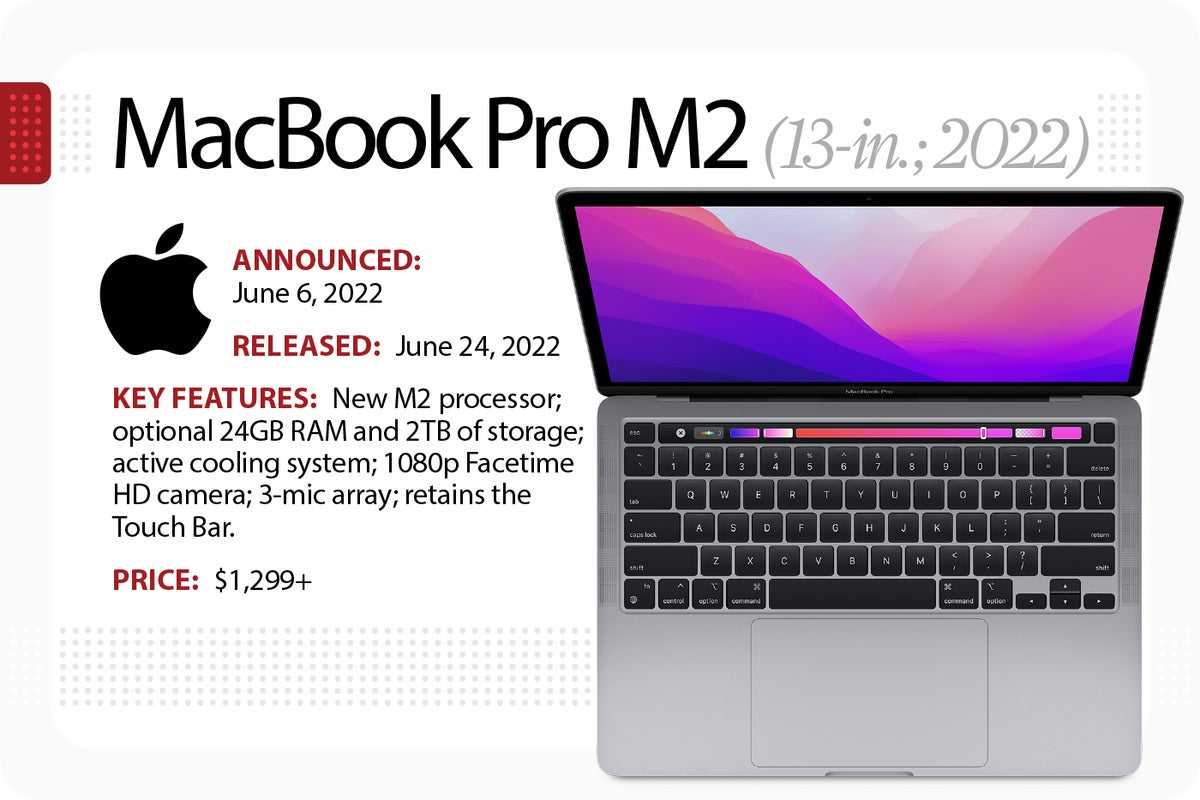 Apple / Foundry
Apple / FoundryUnveiled in tandem with the latest MacBook Air, the 13-in. MacBook Pro moves to the M2 chip with an 8-core CPU and a 10-core GPU. It now supports up to 24GB of unified memory and up to 2TB of storage — and remains the only Apple laptop with the Touch Bar. It continues to be offered in Silver and Space Gray, offers a 720p camera, stereo speakers and weighs in at 3 pounds.
MacBook Pro 14-in and 16-in M2 (2023)
 Apple / Foundry
Apple / FoundryApple started off 2023 with updated versions of the MacBook Pro that feature the company’s M2 Pro and M2 Max processors. In addition to being faster than the M1-based models, the new MacBook Pros feature battery life of up to 22 hours. For better wireless connectivity, the new model supports Wi-Fi 6E, up to twice as fast as the previous generation, and advanced HDMI for 8K displays. The M2 Max could be ordered with up to 96GB of unified memory. Both the 14-in. and 16-in. models have Liquid Retina XDR displays, a 1080p FaceTime HD camera, a six-speaker sound system, and studio-quality mics.
MacBook Air 15-in. (2023)
 Apple / Foundry
Apple / FoundryApple’s popular MacBook Air line got an entirely new version with the arrival of the 15.3-in. model, which Apple said is 25% larger than the 13-in MacBook Air. The M2-based laptop features a Liquid Retina display that delivers up to 500 nits of brightness and support for 1 billion colors. Weighing in at 3.3 pounds, this MacBook Air is 11.5mm thick; Apple claimed it is the world’s thinnest 15-in. laptop.
The M2 chip in the 15-in. MacBook Air has an 8-core CPU (four performance cores and four efficiency cores), a 10-core GPU, and a 16-core Neural Engine. The M2 also supports up to 24GB of unified memory and offers up to 18 hours of battery life. Other highlights include a silent, fanless design, an all-new six-speaker sound system that can play immersive Spatial Audio, a 1080p FaceTime HD camera, and MagSafe charging.
Available in four colors — midnight, starlight, silver, and space gray — the 15-in. model comes with 8GB of unified memory and starts at $1,299. Fully upgraded models with 24GB of RAM and 2TB of storage cost $2,499.
MacBook Pro 14-in and 16-in M3 (2023)
 Apple / Foundry
Apple / FoundryIn something of a surprise, Apple in late 2023 updated the MacBook Pro again — now with new M3-based processors. The new 14-in. MacBook Pro features an M3 Apple Silicon chip, while the 16-in. models get either an M3 Pro or M3 Max processor. The M3 chip in the smaller model has an 8-core CPU, a 10-core GPU, and a 16-core Neural Engine; the M3 Pro comes with a 12-core CPU, an 18-core GPU and either 18GB or 36GB of unified memory; the top-of-the-line M3 Max has a 14-core GPU, a 30-core GPU, and either 36GB or 48GB of unified memory. (The top-end model can be ordered with up to 128GB of RAM and an 8TB SSD, and costs $7,199 in that configuration.)
In addition to unveiling the new 3-nanometer processors, Apple introduced a new color, “space black,” a dark aluminum color with a special finish designed to reduce fingerprints. Otherwise, the design and features largely match the M2 models, though the Liquid Retina XDR display can deliver 1000 nits sustained brightness and 1600 nits of peak brightness for HDR content.
